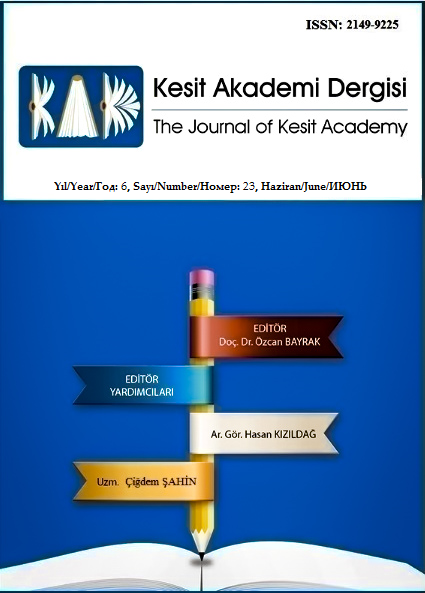TERÖR OLAYLARININ YOĞUN OLARAK YAŞANDIĞI BAZI ÜLKELERDE KALKINMA GÖSTERGELERİNİN KARŞILAŞTIRILMASI: AMPİRİK ANALİZ
Author :
Abstract
Terör, toplumda kültürel, ekonomik, sosyolojik, psikolojik, hukuki vb. her alanda tahribatlara yol açan olağan dışı bir durum olarak tanımlanmaktadır. İktisat literatürüne göre, belirli zaman aralıklarında ve ekonomideki hareketliliği olumsuz yönde artıran olaylardır. Analiz, Türkiye ile Suriye, Mısır, Afganistan, Pakistan, Nijerya, Irak, Cezayir, Lübnan ve Somali olmak üzere 10 ülkeyi kapsamaktadır. Türkiye’nin bu dokuz ülke karşısındaki kalkınma durumunu belirlemek amacıyla çok değişkenli istatistiksel yöntemlerden kümeleme analizi uygulanmış ve analiz sonucunda Türkiye’nin hangi kümede yer aldığı yani teröre mağdur hangi ülke ile sosyo-ekonomik açıdan birbirlerine benzediğini tespit etmek amaçlanmıştır. Çalışma, hem 10 ülkenin hem de Türkiye’nin göreli gelişme düzeyini ortaya konulması hem de terörün yoğun yaşandığı bu ülkelerin kalkınma göstergeleri açısından karşılaştırılması bakımından literatürdeki boşluğu dolduracaktır. Analiz sonucunda ise Türkiye, Pakistan ve Nijerya ile aynı kümede yer almaktadır yani, kalkınma göstergeleri bakımından birbirine benzemektedirler.
Keywords
Abstract
Terror is defined as an extraordinary situation in the society that leads to destruction in all areas of cultural, economic, sociological, psychological, legal, etc. According to the economic literature, it is the events that increase the mobility of certain time intervals and the economy in a negative way. The analysis covers 10 countries, including Turkey and Syria, Egypt, Afghanistan, Pakistan, Nigeria, Iraq, Algeria, Lebanon and Somalia. A clustering analysis of multivariate statistical methods was applied to determine the development status of Turkey across these nine countries. As a result of the analysis, it is aimed to determine the socio-economic aspects of which Turkey is involved in the cluster. The study will fill the gap in the literature in terms of the comparison of the relative development level of both 10 countries and Turkey, as well as in terms of the development indicators of these countries where the terror is experiencing intense. As a result of the analysis, Turkey is located in the same cluster as Pakistan and Nigeria, so they resemble each other in terms of development indicators.
Keywords
- Akıncı, M., Akıncı, G. Y. ve Yılmaz, Ö. (2014). Terörizmin Enflasyon Ve Ekonomik Büyüme Üzerindeki Etkileri: Panel İki Aşamalı En Küçük Kareler Yöntemi. Uluslararası Güvenlik ve Terörizm Dergisi, 5(1), 1-24.
- Atik, H. ve Ertaş, S. (2016). Kalkınma Göstergeleri Bakımından Türkiye’nin Avrupa Birliği Ülke- leri Arasındaki Yeri: İstatistiksel Bir Analiz. Erciyes Üniversitesi İktisadi ve İdari Bilimler Fakültesi Dergisi, 48, 199-218.
- Atik, H. (2015). Türkiye’de 6360 ve 6447 Sayılı Kanunlarla Kurulan Büyükşehirlerin Göreli Kal- kınma Düzeyleri. TİSK Akademi, 10(20), 370-389.
- Barna, F., Seulean, V and Mos, M. (2011). A Cluster Analysis of OECD Pension Funds. Timişoara Journal of Economics, 4(15), 143-147.
- Bloomberg, S.B. Hess, G.D and Orphanides, A. (2004). The Macroeconomic Consequences of Terrorism, Journal of Monetary Economics, 251, 1007-1032.
- Choi, W. (2015). Economic Growth and Terrorism: Domestic, International and Suicide. Oxford Economic papers, 157-181.
- Ertaş, S. ve Atik, H. (2016). Kalkınma Göstergeleri Bakımından Türkiye’nin OECD Ülkeleri Ara- sındaki Yeri: İstatistiksel Bir Analiz. Kesit Akademi Dergisi (The Journal of Kesit Academy), 2(5), 13-24.
- Gaibullloev, K. and Sandler, T (2009). The Adverse Effect of Transnational and Domestic: Terrosizm on Growth in Africa, Journal of Peace Research, 67 (1), 355-371.
- Gries, T., Krieger, T. and Meierrieks, D. (2011). Causal Linkages Between Domestic Terrorism and Economic Growth. Defence and Peace Economics. 22(5), 493-508.
- Jacquemin, A. and Sapir, A. (1996). Is a European Hard-Core Credible? A Statsitical Analysis. KYKLOS, 49, 105-117.
- Llussa, F. and Tavares, J. (2011). The Economıcs of Terrorısm: A Taxonomy of The Literature. Defence and Peace Economics, 22(2), 105-123.
- Meierrieks, D. and Gries, T. (2013). Causality Between Terrorism and Economic Growth. Journal of Peace Reserarch, 5(1), 91-104.
- Öcal, N.ve Yıldırım, J. (2010). Regional Effects of Terrorism on Economic Growth in Turkey: A Geographically Weighted Regression Approach. Journal of Peace Research, 47(4), 477489.
- Shahbaz, M. (2013). Linkages Between Inflation, Economic Growth and Terrorism in Pakistan. Economic Modelling, 32(C), 133-156.
- Younas, J. (2015). Does Globalization Mitigate The Adverse Effects of Terrorism on Growth. Oxford Economic Papers, 67(1), 133-156.
